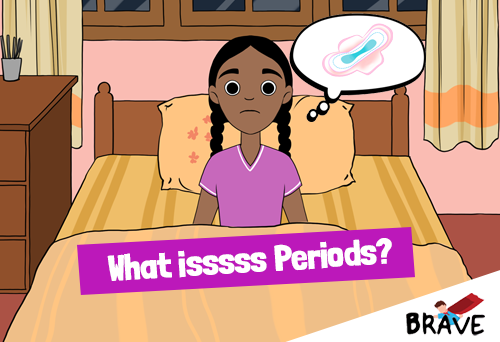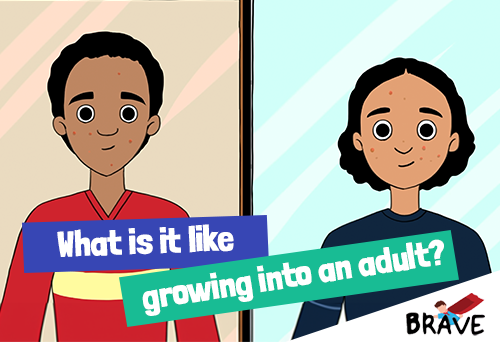




The age range of 10 to 19 is often referred to as ‘Adolescence’, a transformative phase where secondary sexual characteristics begin to emerge. During this time, your body undergoes significant physical changes, your thoughts and emotions evolve, and even the way you interact with others starts to change.
During adolescence, the reproductive system undergoes various changes driven by hormones—chemical messengers produced by specific organs in your body called glands. The most important of these is the pituitary gland, a small but powerful structure located at the base of the brain. It plays a key role in signalling other glands to produce hormones.
In males, the testes produce testosterone, the hormone responsible for male sexual characteristics. In females, the ovaries release oestrogen and progesterone, which are essential for female sexual development. Additionally, the pituitary gland regulates the production of growth hormones, which are crucial for overall development.
This period is not just about physical growth—it is a time of profound transformation as your body and mind prepare for adulthood.
Has your favorite T-shirt suddenly started feeling tight? Or maybe your school uniform seems a little snug without you realizing it? These are just a few signs of the many changes your body goes through as you transition from childhood to adolescence.
One of the key milestones during this phase is the beginning of ovulation in girls and the production of sperm in boys. These changes are triggered by hormones, the chemical messengers that your body produces to regulate various processes.
In girls, the primary hormones are estrogen and progesterone, while in boys, testosterone plays the central role. Some changes caused by these hormones are specific to boys, while others are unique to girls. These hormonal shifts not only bring about physical changes but also set the stage for adulthood, shaping the next chapter of your life.
* Height and weight gain
* Breast enlargement
* Skin lightening
* Widening of the hips
* Thigh enlargement
* Hair growth around the armpits and genitals
* Acne on the face
* Vaginal discharge
* Menstruation or the beginning of the menstrual cycle
* Increase in height and weight
* Enlargement of the penis, testicles and prostate
* Broadening of the shoulders
* Thighs, muscle enlargement
* Hair growth on the chest, armpits and genitals
* Acne on the face
* Enlargement of the larynx
* Hoarseness of voice
* The appearance of facial hair
* Ejaculation occurs
Excerpt - Grade 7 Health and Physical Education Page 156
This period brings not only physical changes but also significant mental and emotional shifts:
* Frequent mood changes
* Increased sensitivity
* A tendency to think logically
* A tendency to think scientifically
* A drive to try out new things
* A drive to create new ideas
* Interest in body shape, appearance, clothing, and hairstyles
* A display of independence
These are just a few of the changes that occur during this time.
Along with these physical and mental developments, the way we behave in society also changes during this period:
* Emergence of romantic feelings
* Enjoying peer company
* ganging up
* Resistance to injustice/justification
* Desire to do public affairs
* Desire to enter adult society
* Desire to stand out among others
* Willingness to lead
The age at which these changes first begin to occur and the time it takes for them to occur can vary from person to person. That's why it's important not to be too quick to compare yourself to others your age. Grow and mature in your own way and at your own pace.
A phase filled with new emotions, new desires, new friends, and new challenges.
Below are some of the key psychological and social changes that occur during this time of life.
As your body goes through numerous changes during this period, it’s natural to become more sensitive to physical discomforts and your appearance. You might find yourself feeling self-conscious more often than usual—it's a phase when even the smallest details can feel like a big deal.
This is the time when you're probably asking yourself, "Who am I?" More than ever, you start thinking about your place in the world. You’ll likely spend more time with friends than family, and this shift marks the beginning of your journey towards independence from your parents. It’s completely natural—part of the process of finding your own path.
During this time, you begin to think about your future—career, marriage, children—and what kind of life you want to build. This is also when your family and close ones might have new expectations for you, and those might start to change. With these evolving expectations, you may find yourself facing bigger responsibilities than ever before.
You and your friends, along with the influences around you—especially those promoted by the media—may feel the urge to follow certain trends. The way you dress, talk, and even behave might change to fit what you think is popular. Your likes and dislikes may shift more often than you expect. This could also be your way of fitting in with your peer group.
Peer pressure can influence you in both positive and negative ways. If you’re being pressured to do something you’re not comfortable with, take a moment to consider whether staying in that group is truly in your best interest.
One moment you might feel excited and joyful, and in the next, you could suddenly find yourself feeling sad or down. The emotional shifts are natural during this time, and learning to manage them is part of the journey.
As you move through adolescence, your body becomes sexually mature. It’s common for many to explore their own bodies with masturbation during this time. Along with that, curiosity about sexual behaviours and attraction to others may begin to emerge. Feeling attracted to someone, whether they’re male or female, is completely normal.
You might also experience new feelings while reading a romantic novel or watching a film. These feelings are natural, and it’s important not to feel guilty about them. If you have questions about sexuality or sexual behaviours, it’s helpful to speak with a trusted adult. School counsellors are trained to provide guidance on these topics, so don’t hesitate to reach out to them. If you don’t have that support, you can always look for help from other trusted adults or resources.
When sexual arousal occurs, it triggers the straightening of sexual organs. In males, this is more easily noticeable than in females.
This happens because of increased blood flow to the sexual organs during arousal. For males, the blood flow increases to the penis, causing it to enlarge and become erect. In females, the increased blood flow causes the vaginal walls, clitoris, nipples and labia to swell and become more sensitive to touch.
For males, this response results in the penis becoming longer and more erect than usual. For females, arousal leads to the release of vaginal lubrication, known as vaginal discharge. This discharge acts as a natural lubricant during sexual activity and helps reduce friction.
One of the key changes girls experience during this time is the onset of ovulation. This initial ovulation is often referred to as the beginning of womanhood or puberty in society.
During this time, a female’s reproductive system undergoes significant development. Female reproductive cells, known as eggs, are present in large numbers in the ovaries at birth. As girls enter puberty, these eggs begin to mature. The release of an egg from the ovary, known as ovulation, also begins during this stage.
In the early stages of the menstrual cycle, an increase in estrogen hormone causes the lining of the uterus (endometrium) to thicken. Then, the matured egg is released from the ovary and travels through the fallopian tube. During this period, the hormone progesterone helps the uterine lining further develop, preparing for potential pregnancy by enriching it with blood vessels. If fertilization occurs, this nourishing environment supports the development of the embryo.
When fertilization does not occur, the next stage in the ovulation cycle involves a decrease in the secretion of the hormone’s estrogen and progesterone. As a result, the lining of the uterus begins to shed and separates from the uterus. This tissue, along with blood, is then expelled from the body through the vaginal canal. This process is referred to as menstruation. Since this process operates in a cycle, it is known as the menstrual cycle.
Our older sister got sick and she's now in bed. Mom says we shouldn't go near her. If we do, the baby might get affected.
Ovulation is a natural part of a girl's development. Culturally, it's highly regarded. As a result, there are many stories surrounding it. One common myth is that "it's not good for boys to see a girl when she first starts ovulating." This is a false belief.
We got a packet of rice with a piece of fish from the sports association. These days, I don't really like eating fish.
There's a false belief that during ovulation, you shouldn't eat meat or other foods like fish. Since this is a period of growth, the body's protein needs increase. Eating protein-rich foods like meat, fish, milk, and eggs is actually quite important during this time.
Our village's youth group is holding a religious procession. Since I'm not feeling well, I can't join the procession.
During ovulation, it's been advised that you avoid religious activities. This is based on the myth that blood during ovulation is impure. However, everyone has the right to follow their chosen religion and engage in religious practices.
Mom says, "Don't go out when you're not feeling well."
In everyday behavior, the term "not feeling well" is often used when referring to ovulation. Ovulation is not an illness, so there is no need to avoid it. Another myth is that by not going out during ovulation, the blood will "back up," causing health issues. However, since blood flow is naturally regulated, it's essential to stay clean during this time.
Because of the pain, I can't go to the big aunt's house.
Some people consider the days of ovulation to be an "impure" time (referred to as "kilee"). What’s being expelled during ovulation is just the blood from the body. The difference between menstrual blood and blood from a wound is that menstrual blood consists of a mix of mucus and a small amount of the uterine lining, which is naturally expelled.



Challenge yourself and your friends to test your knowledge, take the quiz
Access to these contraceptives is made easy through public hospitals and health centers where they are provided for free. Families can talk to doctors and nurses to learn about.

Sexual and reproductive health



Things to Read
Menstruation begins during the age of 10 to16 years and continues until menopause around the late 40s or early 50s,...
Sexual and reproductive health



Things to Read
It is important to learn about parts of the sexual and reproductive system to enjoy a fulfilling sexual and reproductive...
Sexual and reproductive health



Things to Read
Maintaining sexual and reproductive health
Sexual and reproductive health



Things to Read
Sexual behavior and sexual satisfaction
Sexual and reproductive health



Things to Read
Let's understand the sexual and reproductive system
Sexual and reproductive health



Things to Read
Let's face the challenges of youth
Sexual and reproductive health



Things to Read
Sexual and reproductive health conditions affecting men
Sexual and reproductive health



Things to Read
How to maintain personal hygiene?
Sexual and reproductive health



Things to Read
Sexual and reproductive health conditions that affect transgender individuals
Sexual and reproductive health



Things to Read
Sexually transmitted infections
Sexual and reproductive health



Things to Read
How does a pregnancy happen?
Sexual and reproductive health



Things to Read
Reproductive health concerns for Men
Sexual and reproductive health



Things to Read
Things to consider before planing a pregnancy
Sexual and reproductive health



Things to Read
Pregnancy related concerns
Sexual and reproductive health



Things to Read
How to keep my body clean